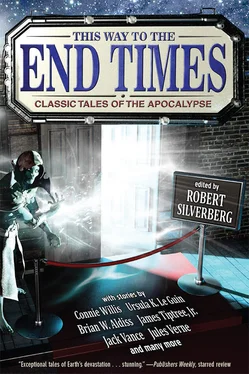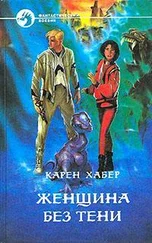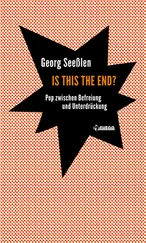And nearly two hundred years had gone by since the last desperate uprising of those two peoples had been bloodily put down, and the land had known for the first time what it was to have peace. Now came the fourth historical period. When everyone had been drawn into a single Empire, with everyone subject to the law of Basidra, there followed a gradual blending of the three races. No longer did anyone speak of Men with Bronze Faces, or Men of the Snow Country, or Men of the Fixed Star. The land now held a single people, the Andarti-Iten-Schu, the Men of the Four Seas.
At the present moment, of course, after two centuries of peace, a fifth period was perhaps in the making. Rumors were afloat that furtive trouble-makers were at work. Certain thinkers had arisen with ideas calculated to reawaken memories of things long forgotten. The old feeling for race was being brought to life, but given a new character by new words. There was much talk of throw-backs, blood-ties, racism, and so forth—all terms of fresh coinage, which, since they answered a need, had promptly been accepted. Depending upon what men had in common, whether bodily likeness, agreement of the mind, shared interests, or simply the accident of living together in the same climate, they were forming groups that little by little were gaining in membership and beginning to show signs of restlessness.
What might be the drift of this new trend? Was the Empire to be torn apart so soon after its birth? Was the Mahart-Iten-Schu to be split, as in the old days, into a great number of nations? Or must it again have recourse to the dreadful slaughter that for so many thousands of years had turned this land into a charnel house?
WITH A SHAKE OF HIS head, Sofr rejected such thoughts. Neither he nor other men knew anything of the future. Why, then, grieve in advance over what might never happen? Besides, this was no day to dwell upon grim forebodings. This was a day for joy, when all should give thanks for the greatness and goodness of Mogar-Si, Twelfth Emperor of the Hars-Iten-Schu, whose staff of office was guiding his people toward a high destiny.
For a Zartog, more than for most, there was much reason to take the cheerful view. After the historians had done reciting the chronicles of the Mahart-Iten-Schu, a half dozen scientists had taken the floor. Each had given a summary of human knowledge in his own special field, and had stressed how far mankind had been brought by centuries of effort. And surely, if the first speakers, in retracing the slow, winding road by which man had made his escape from his animal state, had touched upon some shameful matters, the later speakers had fed in full measure the lawful pride of their hearers.
Yes, most truly, it was a wonderful thing to put man as he once had been—when first he came, naked and unarmed, upon earth—alongside of what he was today. Down through the ages, despite his quarrels and his murderous feuds, not for an instant had he broken off his struggle against nature, and ceaselessly had he enlarged his area of conquest. Two hundred years ago he had been still comparatively crawling; but then he had found his feet, and his triumphal march had begun. The power of his leaders, the soundness of his laws, and the resulting worldwide peace had given a remarkable push to science. No longer relying almost solely upon the strength of his body, man had learned to win with his mind; he had summoned councils, instead of wasting himself in senseless wars. Thus, in the course of the last two centuries, he had moved ever more rapidly through the realm of knowledge toward the day when he should hold the physical world in bondage.
As Sofr followed the long street in Basidra under the scorching sun, his mind swiftly sketched the chart of this fulfillment.
First of all, back somewhere in the Age of Darkness, man had hit upon the art of writing, with the object of fixing and transmitting his thoughts; next—and this was more than five hundred years ago—he had found the means of spreading the written word by way of any number of copies, all struck from a single plate. From this invention, really, flowed all the others. Thanks to it, minds were stirred and broadened, every man’s knowledge was increased by that of his neighbor, and the number of new findings, both theoretical and practical, could no longer be counted.
Man had dug deep into the earth and was drawing out coal, that great source of heat. He had set free the latent energy of water, and now steam was pulling heavy trains on ribbons of steel and was giving motion to all kinds of powerful, delicate, precise machines; with these machines man could weave vegetable fibers into cloth and work his will on metals, marble, and granite. In a less applied field, or at least less directly applied, he was gradually solving the riddle of numbers and exploring the infinite range of mathematical truth. With this tool he had taken the measure of the heavens. He now knew that the sun was only a star gravitating through space, obedient to rigorous laws, sweeping a train of seven planets along its flaming orbit. He knew the art of combining certain crude substances in a way to form new substances having nothing in common with the old, and of separating certain other substances into their simple components. He was submitting sound, heat, and light to analysis and was beginning to determine the nature and laws of each. Fifty years ago he had learned how to produce the force so terribly active in thunder and lightning, and at once he had made it his slave: already this mysterious agent was carrying written messages over immeasurable distances; tomorrow it should carry sound; day after tomorrow, no doubt, light. Yes, man was great—greater than the immense universe that one day, and soon, he should govern as a master!
BUT EVEN THEN, IF THE whole truth were to be grasped, this final problem would have to be resolved: Who was man, this master of the world? Whence came he? Toward what unknown goal was his unflagging effort driving him?
This was exactly the vast problem that the Zartog Sofr had discussed near the close of the ceremonial meeting. To be sure, he had only skimmed the surface, for such a problem was at present insoluble, and doubtless it would remain so for a long time to come. The solution of some related problems, however, would help clear up the mystery. And had not the Zartog Sofr been the one to make the most promising advance when, after having systematized and codified the patient observations of earlier investigators and his own personal findings, he had come out with his law of the evolution of living substance—a law that was everywhere accepted and no longer met with a single opponent?
His theory stood upon a threefold foundation.
First of all, upon the earth sciences, which, born on the day when digging in the interior of the earth began, had progressed along with the development of mining operations. The crust of the globe had been so thoroughly studied that its age could be unhesitatingly fixed at four hundred million years, and that of the Mahart-Iten-Schu, in its present form, at twenty thousand years. At an earlier period this continent had been sleeping under the waters of the sea, as witness the thick bed of marine clay that uninterruptedly covered the underlying beds of rock. By what mechanism had it been thrust up above the waves? Perhaps by the contracting of the globe as it cooled. But, however that might be, the emersion of the Mahart-Iten-Schu must be considered a certainty.
The life sciences had furnished Sofr with the two other foundations of his system. By proving the close kinship of all plants and the equally close kinship of all animals. Sofr had gone farther: he had discovered evidence that nearly all existing vegetable life had descended directly from an ancestral marine plant, and that nearly all land or aerial animals came from ancient marine animals. By a slow but continuous evolution, the animals had adapted themselves little by little to living conditions at first close to, but afterwards more remote from, those known to their forbears; and so they had fathered most of the present species of animals and birds.
Читать дальше











